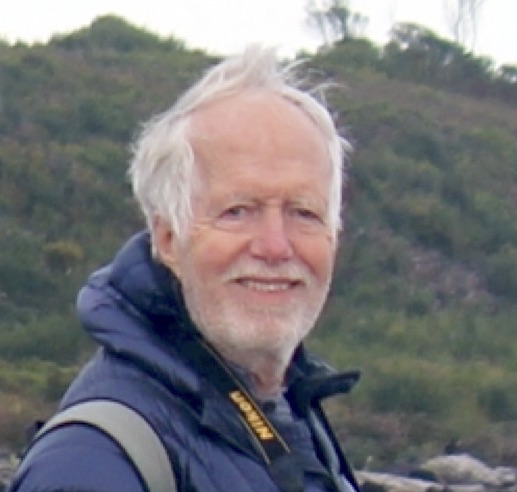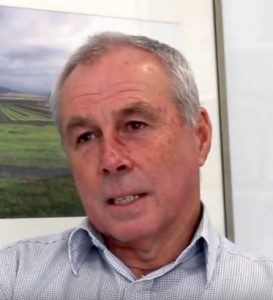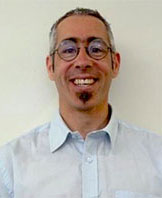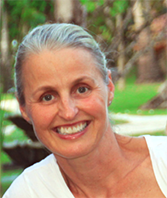The Climate Tasmania board comprises: Dr John Hunter, Dr John Todd, Anthony Houston, Dr John Church, Brook Dambacher, David Hamilton, Dr Nick Towle, Kay Hunter, Peter Boyer, Chris Harries and Margaret Steadman.
The group has also enlisted the following as expert advisers: Jack Gilding, Professor Jan MacDonald, Phil Harrington and Matthew Pitt.
Please see below for brief biographical notes on each.
JOHN HUNTER
Dr John Hunter is a climate scientist working in an emeritus position at the Antarctic Climate and Ecosystems Cooperative Research Centre, based in the University of Tasmania. His current interests are the sea-level rise induced by climate change, and the response of Antarctic Ice Shelves to global warming.
John’s interest in sea-level rise was initially stimulated in the mid-1990s by his work (with others) on the historic sea-level mark at the Isle of the Dead, Port Arthur, which indicated where sea level was in 1841. This was one of the first such marks struck anywhere in the world for the scientific investigation of sea level. Recent work has involved investigations of sea-level rise in Australia, the U.S., and in the Indian Ocean and Pacific regions, and the way in which this rise increases the frequency and likelihood of flooding events.
He was the original developer of the “Canute” sea-level rise decision-support tool (see sealevelrise.info). In recent years he developed a method of deriving sea-level planning allowances based on projections of sea-level rise and present storm-tides; the techniques has been used in Tasmania, Victoria and more widely around Australia and Canada. He has a keen interest in seeing that the science of climate change is accurately communicated, not distorted by the so-called “climate skeptics” and is appropriately incorporated into public policy.

JOHN TODD
Associate Professor John Todd has a PhD in atmospheric physics (Melbourne University 1974) and a professional career spanning government, consulting and academia.
As a lecturer and researcher in Environmental Studies at UTas (1978 to 2001), John’s interests cover a broad range of interdisciplinary environmental issues.
But it’s his interest in atmospheric physics that drives his profound concern about climate change and its impact on the well being of his grandchildren.

ANTHONY HOUSTON
Tasmanian business entrepreneur, David Houston, developed an Australia-wide food outlet over 25 years ago, Houston Farm, – providing fresh food produce into the Australian market.
Houston’s Farm salad bags and bowls are sold in more than 1400 stores nationally. His business ethic is pivoted around ecological principles and cutting edge innovation in farming and marketing.
 Dr JOHN CHURCH
Dr JOHN CHURCH
John Church is an Emeritus Professor in the Climate Change Research Centre, University of New South Wales.
He has published across a broad range of topics in oceanography, his principal area of expertise being the role of the ocean in climate, particularly anthropogenic climate change, and in understanding global and regional sea-level rise.
- Author of over 180 refereed publications, over 110 other reports and co-edited three books.
- Has been co-convening lead author for the Chapter on Sea Level in the IPCC Third and Fifth Assessment Reports.
- Awarded the 2006 Roger Revelle Medal by the Intergovernmental Oceanographic Commission, a CSIRO Medal for Research Achievement in 2006, the 2007 Eureka Prize for Scientific Research, the 2008 AMOS R.H. Clarke Lecture, the AMOS Morton Medal in 2017, a joint winner of the BBVA Frontiers of Knowledge Climate Change Category Prize in 2019 and the AAS Jaeger Medal in 2021.
- He is an Officer of the Order of Australia, a Fellow of the Australian Academy of Science, the Australian Academy of Technology and Engineering, the American Geophysical Union, the American Meteorological Society and the Australian Meteorological and Oceanographic Society.
DAVID HAMILTON
Educated in physics, David worked as an occupational hygienist for many years and is Retired Fellow of the Australian Institute of Occupational Hygienists. In that capacity he gained solid experience in government, consulting and industry.
He also has professional experience in coal liquefaction and in the oil and gas sectors. Following his career retirement David worked as an energy consultant for several years, where he advised on energy efficiency, renewable energy and the reduction of greenhouse gas emissions.
David is the Chairman of Dorset Renewable Industries Pty Ltd and Dorset Renewable Co-operative Limited, both of which have the objective of encouraging, promoting and developing the sustainable use of renewable resources in ways that benefit the community.
David is committed to improving community resilience through appropriate, sustainable development. He thinks that small to medium sized businesses that meet local needs from local resources are more likely to provide sustainably beneficial economic activity than will large, remotely headquartered businesses. David accepts the evidence of climate science – that we need to transition away from fossil fuels as quickly as possible. He believes that the energy transition will provide great opportunities for communities to take more control of their futures.
DR NICK TOWLE
Dr Nick Towle is a Medical Doctor based in Burnie with an active interest in sustainability and climate change. He is a lecturer at the University of Tasmania, Rural Clinical School where he is also a sustainability representative.
Current research interests include the impacts of climate change and peak oil on the health of individuals and communities and positive adaptive responses to these global challenges. Nick also has training in Home Sustainability Assessment.
Nick has been active in Doctors for the Environment Australia as a Committee member over several years involving policy development and advocacy on national environmental health issues. He is a presenter with the Al Gore Climate Reality Project. In addition to public presentations he has lead a range of school and home sustainability projects.
PETER BOYER
Peter Boyer is a journalist who specialises in science communication, mainly in the area of climate science and is an Al Gore team leader. He writes a regular column on climate change for the Hobart Mercury.
Peter Boyer was awarded an Order of Australia Medal in 2014 for his service to environment, particularly in the field of climate science.
Peter had joined the staff of the Australian Antarctic Division in the late 80s, and there developed an appreciation and affiliation with the science community. In this role Peter became increasignly concerned with the emergent climate trends.
In 2006, he was selected as one of only 84 people to attend the first Climate Reality training session with ex US Vice President Al Gore.
CHRIS HARRIES
Chris Harries is an environmental educator working in the non-government sector and has extensive experience in energy conservation and behaviour change programs.
He has participated in Australian and State government sponsored sustainability projects and advises on energy supply and demand issues.
MARGARET STEADMAN
Margaret provides secretarial and logistic support for Climate Tasmania. Former CEO of Sustainable Living Tasmania, Margaret has extensive experience in environmental education, community development and management of numerous environmental projects and programs.
EXPERT ADVISORS

JACK GILDING
Jack Gilding is the Executive Officer of the Tasmanian Renewable Energy Alliance. He has a detailed understanding of energy policy and financial and regulatory arrangements at both the state and national level.
His company Backroad Connections provides research, consultancy and project management on the planning and implementation of new technologies with a particular emphasis on community renewable energy. He has worked on a feasibility study for community owned renewable energy projects in the Waterworks Valley and was involved with the development and funding of the TasTex community funded solar project in Glenorchy. He is currently assisting the community group Tasman Peninsula Power to implement Tasmania’s first community microgrid.
Before moving to Tasmania, Jack was the Executive Officer of Hepburn Wind, the co-operative that built Australia’s first community-owned wind farm.
Prior to Hepburn Wind he held a number of positions related to technology policy including with the Victorian Office of Training and Further Education and in the Corporate Strategy section of Telstra.
PROFESSOR JAN MACDONALD
Jan McDonald is Professor of Environmental Law at the University of Tasmania. Before joining the University of Tasmania Faculty of Law in 2011, she was Director of Griffith University’s Climate Change Response Program, and led Griffith’s successful bid to host the National Climate Change Adaptation Research Facility (NCCARF).
As NCCARF’s Interim Director, she worked with researchers and stakeholders across the country to identify Australia’s climate adaptation research needs in human health, settlements and infrastructure, emergency management, marine biodiversity and resources and terrestrial biodiversity.
Jan has published across a wide range of environmental law topics, has worked for the United Nations Development Program in the Pacific, and has consulted to local and State government, non- government organisations, and the governments of Solomon Islands and Vanuatu. Her current research spans the legal and policy dimensions of climate change adaptation, including urban planning and coastal management, liability and insurance issues.

PHIL HARRINGTON
Phil Harrington manages the professional services consulting agency Policy. Research. Pty Ltd (SPR) and holds degrees in Arts and Applied Economics.
He has been engaged in climate change and energy policy development, analysis and administration for nearly 30 years in a wide range of professional capacities.
Phil has previously held the positions of:
• Team Leader, Carbon & Energy at Pitt and Sherry Pty Ltd
• Senior Executive Manager, Australian Greenhouse Office in Canberra
• Head of Energy Efficiency Policy Analysis Division at the International Energy Agency (Paris)
• Deputy Secretary in the Tasmanian Department of Infrastructure, Energy & Resources
• Group Manager, Market & Regulatory Policy, Aurora Energy.
He has recently prepared an Energy Efficiency Master Plan – Foundation Report for the City of Sydney; a solar access study for the City of Melbourne; has been called as an expert witness to VCAT to establish the economic bona fides of Environmentally Efficient Design planning policies on behalf of six Melbourne councils; and has completed a major national review of compliance with the energy performance requirements of the National Construction Code. Phil is also an active member of Climate Action Hobart.
MATTHEW PITT
Ouse farmer, Matthew Pitt, has farmed in the Derwent Valley for thirty years, grazing and cropping on the Pitt family property that was originally established in 1850. More recently he has been contracting on properties with a focus on increasing minimum tillage using cropping systems.
Matthew has been leading from the front by developing a sustainable farming enterprise that promotes best practice natural resource management.
As part of his work, Matthew has chaired the Upper Derwent Valley Landcare Group, the Derwent Valley Catchment NRM, Landcare Tasmania. He was appointed to the board of NRM South, has been active in the national Landcare Network and has been instrumental in developing the Derwent Catchment Management Plan.
As part of the Climate Champions program he worked to improve communication between the Bureau of Meteorology and the farming community and has been working to ensure that research matches needs in terms of sustainable farming practices.













